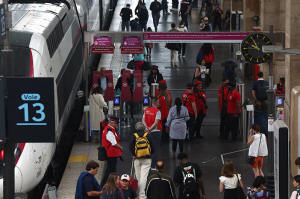Saboteurs attack French railways, causing chaos hours before Olympic
ceremony
 Send a link to a friend
Send a link to a friend
 [July 26, 2024]
By Dominique Vidalon, Elizabeth Pineau [July 26, 2024]
By Dominique Vidalon, Elizabeth Pineau
PARIS (Reuters) -Saboteurs struck France's TGV high-speed train network
in a series of pre-dawn attacks that caused chaos on the country's
busiest rail lines ahead of the Paris Olympics opening ceremony on
Friday.
The coordinated sabotage took place as France rolled out an
unprecedented peacetime security operation involving tens of thousands
of police and soldiers to lockdown the capital for the Games, sucking in
security resources from across the country.
The state-owned railway operator said vandals had damaged signal boxes
along the lines connecting Paris with cities such as Lille in the north,
Bordeaux in the west and Strasbourg in the east. Another attack on the
Paris-Marseille line was foiled.
Hundreds of thousands of people were left stranded at rail stations.
There was no immediate claim of responsibility. But two security sources
said initial suspicions fell on hardline leftist militants or
environmental activists.
"Everything leads us to believe that these were criminal acts,"
Transport Minister Patrice Vergriete told reporters at the Gare du Nord.
The coordinated strikes on the rail network will feed into a sense of
apprehension ahead of the Olympics opening ceremony in the heart of
Paris later on Friday.

More than 300,000 spectators are expected to line the banks of the River
Seine when the athletes parade through the heart of Paris on a flotilla
of barges and riverboats, part of an extravagant opening ceremony that
will be watched by a global audience of billions.
The SNCF urged all travelers to postpone their journeys. Repairs were
underway but traffic would be severely disrupted until at least the end
of the weekend. Trains were being sent back to their points of
departure.
The attacks hit signaling installations on the Atlantic, Northern and
Eastern high-speed lines with fires set off by explosive devices, the
SNCF said.
SNCF chief Jean-Pierre Farandou said some 800,000 customers had been
impacted ahead of a busy weekend for French holidaymakers. Thousands of
rail staff had been deployed to repair the damage.
DESTABILIZING FRANCE
"This attack is not a coincidence, it's an effort to destabilize
France," Valerie Pecresse, president of the Paris region, told
reporters.
[to top of second column]
|

Paris 2024 Olympics - Previews - Gare du Nord, Paris, France - July
26, 2024. Staff and passengers are pictured at Gare du Nord station
after threats against France's high-speed TGV network, ahead of the
Paris 2024 Olympics opening ceremony. REUTERS/Yves Herman

France is deploying 45,000 police, 10,000 soldiers and 2,000 private
security agents to secure the opening ceremony. Snipers will be on
rooftops and drones keeping watch from the air.
But while the capital is locked down for the opening ceremony,
security elsewhere in the country is lighter.
Paris 2024 said it was working closely with the SNCF to assess the
situation. The attacks will make it tougher for people travelling to
Paris from other areas of France.
Some teams like the U.S. basketball team are based in Paris and
would have travelled on Saturday by train to the northern city of
Lille.
The Paris police chief said he was beefing up security even further
at the capital's main stations.
The stations were packed with passengers. Many were preparing to go
off on their summer holidays and some had already been waiting
several hours.
At the Gare de L'Est, traveler Corinne Lecocq said her train to
Strasbourg on the border with Germany had been cancelled.
"We'll take the slow line," she said. "I'm on holiday so it's OK,
even if it is irritating to be late."
Xavier Hiegel, 39, said he was just trying to get home for the
weekend and could not believe that people would want to harm the
Olympics.
"The Games bring jobs so this really is nonsense. I hope the people
responsible will be found and punished," he said.
(Additional reporting by Marine Strauss, Juliette Jabkhiro; writing
by John Irish; editing by Richard Lough, Angus MacSwan and Rachel
Armstrong)
[© 2024 Thomson Reuters. All rights
reserved.]This material
may not be published, broadcast, rewritten or redistributed.
Thompson Reuters is solely responsible for this content.
 |